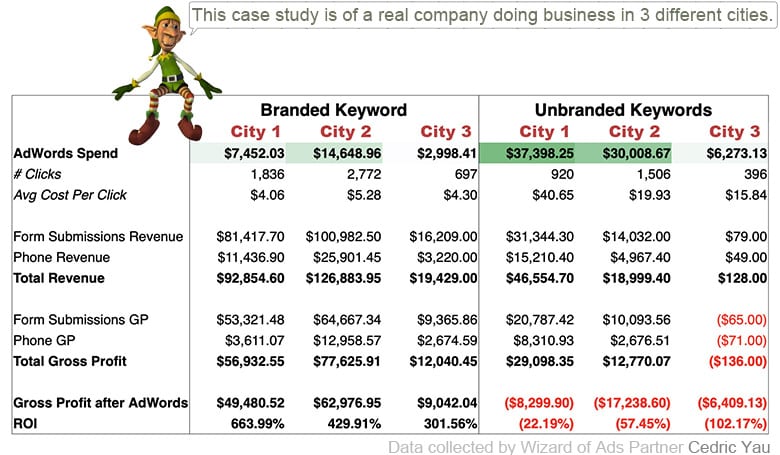
If you’ve done any SEO (search engine optimization) or PPC (pay-per-click) campaigns for your company, you know how tricky it can be to select the right keywords. As a business owner, you may find yourself in a game of cat and mouse, trying to figure out how to use keywords that represent your brand without getting penalized by Google or getting buried under the competition. To maximize your clicks, leads, and conversions, you need to choose a mix of unbranded and branded keywords.
But how do you know which ones will work best for your business? Well, we’ve got the answers for you here. We decided to take a closer look at the branded vs. unbranded keyword debate by analyzing the performance of a real company’s SEO and PPC campaign. This data will help you understand just what needs to be done to get the best results for your business. Let’s take a look!
What are Branded and Unbranded Keywords?
When it comes to keywords, there are two main types: branded and unbranded. Branded keywords are those that include the name of your company or product, misspellings, taglines, visual representations, and brandable chunks. Non-branded keywords are more generic keyword terms that don’t include any specific brand references, rather speak to your category, customer pain points, and most likely search terms or your products and services. For example, if you are an HVAC company named “Acme Heating and Cooling”, some of your branded keywords might be “Acme Air Conditioning”, “Acme Heating”, or “Acme Heating and Cooling”. On the other hand, some unbranded keywords related to your business might be “air conditioning repair near me”, “air conditioner installation”, or “furnace no heat”.
There are benefits and drawbacks to using both types of keywords. Branded keywords are essential in 2022 to get your website to rank above the fold for your company name, which help increase brand awareness. However, you need to have a brand in demand before a branded keyword campaign will be an effective strategy. Unbranded keywords, on the other hand, tend to be hyper-competitive and are necessary when getting started in a new business. Be warned, it is scientifically impossible to leverage unbranded keywords to drive brand awareness and become a household name. Ultimately, the best approach is to use a mix of both branded and unbranded keywords to give your website the best chance of ranking high in search results.
A Case Study of a Real Company
To see how an unbranded and branded keyword strategy works in detail, check out this case study pulled from a real-life company so graciously provided by our Wizard of Ads Partners:

Although we took out the company name, the category, and the cities, the data is 100 percent real and accurate.
- As you can see, this company spent $37,398 on unbranded keywords in City 1 so they could have the privilege of losing $8,299.
- Then, they spent $30,008 on unbranded keywords in City 2 so that they could have the privilege of losing $17,238.
- Lastly, they spend $6,273 on unbranded search in City 3 so that they could have the privilege of losing $6,409.
It’s safe to say that after losing $31,946, they probably grew tired of feeling privileged. Wouldn’t you? Now when we look at the branded keywords, it tells us a different story.
- In City 1, this company’s investment of only $7,452 in branded keywords made them a gross profit of $49,480. This is after deducting the costs of their branded keywords.
- In City 2, their investment of only $14,648 in branded search made them a gross profit of $62,976.
- And finally, in City 3 their investment of only $2,998 in branded keywords made them a gross profit of $9,042.
Digital weasels look at this and wonder why the heck would we track this company’s unbranded and branded keywords separately. They cheerfully point out that combining them into one big package will result in a perfectly acceptable return on investment. That’s what grifters, cons, and shim-sham artists all think.
It’s Important to Track Branded and Unbranded Keywords Separately

It’s important — especially in the digital world we rely on today — to create campaigns that not only monetize all the customer enthusiasm from digital platforms, but offline ones as well. When I say offline, I’m talking about the big 3 mass media — TV, radio, and outdoor advertising. There’s a tactic in the industry called “cross-channel marketing,” and it doesn’t just mean being present on multiple platforms. It means tracking each one of your channels — whether it’s online or offline — separately so you can see which ones are working and which ones aren’t. In this case, branded keywords are what’s driving in revenue. And if we didn’t track branded and unbranded keyword ranking reports separately, we wouldn’t even be aware of how much money the unbranded keywords were losing for this particular company. To truly optimize your keywords and maximize your revenue, you need to do the same. So what kinds of tracking can be done? Here are some examples:
- Separating branded ad campaigns from unbranded campaigns to measure volume and costs.
- Tracking organic searches for your website.
- Tracking direct traffic to your website.
By tracking each channel separately, you’ll have a clearer picture of which ones are performing well and which ones could use some improvement. And from there, you can make changes to improve your overall marketing strategy.
Don’t Hire Digital Weasels
So what do we mean when we say Digital Weasel? These are marketers that fail to deliver on what they proudly promised their customers. They make all sorts of grandiose claims, but in the end, they don’t come through. They are the type you’d wanna pull aside, put your arm around their shoulders, and whisper in their ears, “Be careful not to let your alligator mouth overload your mockingbird butt.”
But if you’re a bit more mellow and mature than we are, you may instead want to listen to the words of Les Binet — a data scientist (and non-digital weasel) who monitored the advertising of more than 1,000 businesses for over 15 years. “If you build your business, or try to build your business, using short-term efficiency measures – cost per response, click-through rates, that kind of thing – you’re certain to fail.” You’re going to run your business into the ground, we believe, because those are not the things that grow the business, long-term. Les Binet goes on to say, “You need to talk to people, not just who are in the market right now, but people who might come to market over the next two to three years. You need to engage them with things that are more humanly relevant, more general, more universal, and crucially, you need to engage them at the emotional level… So if you want really disproportionately large marketing effects, if you want big sales and big profits, aim for fame.”
Aim for Fame
 Are you a fame seeker? Do you want your SEO and PPC keywords — branded and unbranded — to make you a household brand name? Well tough, because that’s not how fame works. It is scientifically impossible to become a household name with SEO and PPC as your primary marketing mechanisms. If you’re not speaking to your marketplace through an intrusive mass media channel, you don’t stand a chance. Period.
Are you a fame seeker? Do you want your SEO and PPC keywords — branded and unbranded — to make you a household brand name? Well tough, because that’s not how fame works. It is scientifically impossible to become a household name with SEO and PPC as your primary marketing mechanisms. If you’re not speaking to your marketplace through an intrusive mass media channel, you don’t stand a chance. Period.
We’ll close this article with three key pieces of advice: Make your ads, whether digital or traditional, entertaining, persuasive, and unpredictable. Your target audience will only pay attention when they have a reason to. Don’t play it safe, be unexpected. If your ads are the talk of the water cooler, you’re doing something right. Don’t worry about the complaints. You will never make everyone happy, and if that’s your goal, you’re doing it wrong. Be strategic about the information you put in your ads. Don’t put so much information that your ads feel like ads – make them feel like entertainment. The more new, interesting, and different the information in your ad, the more people will be willing to change their behavior. And you can’t change someone’s behavior (to buy from you) until you first change their beliefs.
And finally, don’t mistake name recognition with becoming a household name. You can have a large majority of people know your name. Ultimately, name recognition is 100% irrelevant if you aren’t the brand in demand. Becoming a household name means they are only calling you, and the “oh sh*t” moments trigger your brand over your competitors in the market. This, combined with unbranded and branded keywords that are tracked separately to better understand your cost of acquisition and brand efforts provide better data from your advertising campaigns.
Need some guidance? Wizard of Ads™ is here to help. We’ll not only help turn your marketing and advertising campaigns into a well-oiled machine, but also help you build a tribe of loyal customers who want to smoke what you’re rolling, and pass your name along to others to as well. Book a call with Ryan Chute, Wizard of Sales® today!
- Futuristic Game for the Ad Masters - July 11, 2024
- Classical Conditioning: Pavlov’s Dog in Advertising - June 20, 2024
- Hear, See, Speak No Advertising - June 9, 2024
